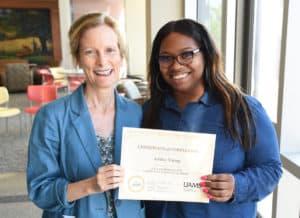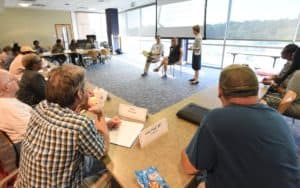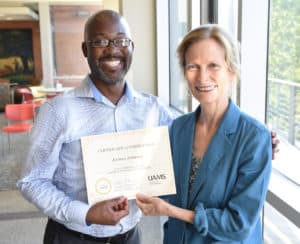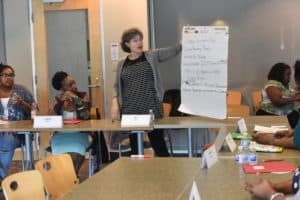
Ashley Young, one of 17 graduates of the UAMS Translational Research Institute’s spring 2018 Community Scientist Academy, said graduation night was bittersweet.
“I loved it. I’m sad that it wasn’t longer,” the Little Rock resident said of the six-week program. “I loved the interactive activities, and I loved how we had a different speaker each week. I also loved the people I met so it’s been a great experience all around.”
The Translational Research Institute established the Community Scientist Academy in 2016 on the recommendation of its Community Advisory Board. Its purpose is to increase community understanding about the research process and offer research decision-making opportunities to communities, patients and other stakeholders. These opportunities include reviewing grants; advising on research projects; serving on community review boards, community advisory boards, and patient and family advisory councils; and assisting with ARresearch, the Translational Research Institute’s research participant registry.
Through four academies it has graduated 44 Arkansans from diverse communities and a variety of socioeconomic backgrounds. The academies are free and open to the public. The next academy is Sept. 25 through Oct. 30. Classes will be each Tuesday, 5:30 – 7:30 p.m. Contact Nicki Spencer, 501-526-6629 or ndspencer@uams.edu, to

register.
Academy graduate JaJuan Johnson of Little Rock thanked the Translational Research Institute in an email for “an insightful six weeks of engaging with medical research experts.”
“I cannot begin to list the areas that most resonated with me, but I can definitely say I am more enlightened and trustworthy of medical research,” Johnson said.
He said the academy deepened his understanding on the importance of community collaboration in medical research.
“I Iook forward to continued work with the Translational Research Institute and will encourage others to get involved,” he said.
Angela Aikens said she was inspired to attend the Community Scientist Academy after being diagnosed last year with empty sella syndrome, a condition involving the pituitary gland that caused her chronic migraine headaches.

“I just really thank God for research,” said Aikens, of Little Rock. “This opportunity to attend and to take part in the discussion and to listen to the physicians and the researchers over the past few weeks really gave me a birds-eye view of what all goes into the research process.”
Victoria Akins, M.D., who was a geriatrician at UAMS until she was diagnosed with multiple myeloma three years ago, attended the Community Scientist Academy as way to stay connected with UAMS.
“I realized that as a physician and as a patient at UAMS, I’m in a unique position to educate the community,” said Akins, of Jacksonville. “The academy enables me to better explain research to community people and to explain to physicians how the community is involved.”
Janet Bowen, a retired UAMS registered nurse, said the academy has provided insight and new perspective.
“Instead of one Institutional Review Board, there are now four,” she said, noting that she was a member of UAMS’ single board in the 1980s. The Institutional Review Board must approve all research that involves human participation.
She was also interested to hear how important grant funding has become. “I was just astounded to hear about the importance of grant funding, and in fact if they don’t have it they may not have a job.”
The graduation keynote address was given by Anna Huff Davis, community representative for the Translational Research Institute Leadership Council and liaison with the UAMS Fay W. Boozman

College of Public Health.
Davis, a past academy graduate, asked the graduates to encourage their family, friends and community to participate in research, either as a study participant or as a community co-investigator.
“Just imagine what would happen if we aren’t involved?” said Davis, also director of the Mid Delta Community Consortium. “I’m hypertensive, and if the medication that I take had not been tested on someone, I don’t know where I’d be today. I don’t even know if that medication would be available. I might not even be here because that medication might not be available for me.”
